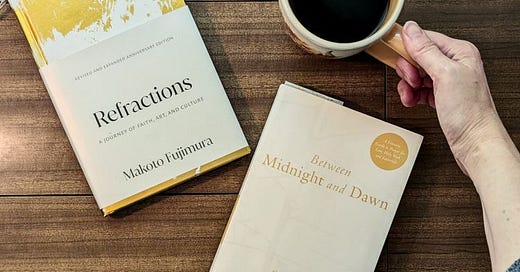When I was growing up in the Methodist church, there wasn’t much emphasis put on keeping to a liturgical calendar at home. On Sundays, the color of the sashes that sat on the pulpit, the cross on the pipes of the organ and the one the pastor wore over his robe changed according to season. Advent was when the candelabra came out and the candles were lit. Easter Sunday, everything was deck in white and throughout the Summer, it was green. I loved the familiarity. Coupled with the Doxology, the Gloria Patri, the Lord’s Prayer, church, for me, was a comfort of ritual and faith that offered respite from the rest of the week.
Becoming Lutheran hasn’t changed much, though I must confess that my husband and I have not had a church home in years. Still, the liturgy comforts and the quiet, contemplativeness of the Church seasons help guide me in my personal spiritual walk.
A decade ago, I found a devotional guide that appealed to both my liturgical upbringing and my bookish nature. “At the Still Point” by Sarah Arthur is a delicious gathering of scripture, poetry and literary excerpts that guide the reader through the long liturgical season of Ordinary Time : the stretch of months between Pentecost to Advent. It’s a wonderful way to start each day of the long, hot Summer, winding down into the cooling Autumn looking toward the dark of Winter. Imagine my delight when I discovered her book “Light Upon Light” which continues the literary/liturgical journey through Advent, Christmas and into Epiphany. The trilogy is complete with “Between Midnight and Dawn”, her guide through the seasons of Lent and Easter which has been my reading companion for the past 35 days.
Thirty-five days. A little over a month. Why, then, does it stretch out from that first Wednesday to now as an unforeseen chasm? Coupled with the sacrifice of sugar, Lent has surely been months not just weeks. And yet, I’m not complaining. I’ve found that these guides allow me to not only start my days with a bit of scripture and literature, but they also slow things down, speak of a quiet cycle of living that perhaps we were meant to inhabit and did before technology began grabbing.
I’ve done online studies before. I’ve received the emails, read the selected features in newsletters and listened to podcasts. And I still enjoy all three. However, there is something far more tangible about a book that can never - will never - be ousted by the convenience of a screen.
Phones are readily available. My alarm goes off daily and the first thing I do is reach for my phone to turn the alarm off. Then I click to the current podcast I’m listening to when I get on the treadmill. I see notifications after that and look for the few newsletters that I get and scan the topics for anything of note.
But the book calls.
It sits on the coffee table waiting. Unobtrusive. It asks for nothing except our attention, our time and focus.
There are no pop-up ads. No mind-numbing background music. There’s no sudden screaming of a chicken or child because you accidentally scrolled too far from the post you were reading.
You.
Pages.
The flickering light of a new day.
Weekly I hear from friends and family how fast the days are going. “I can’t believe it’s already April/Easter/Summer/Fall!” True, this type of conversation is a culturally appropriate sprinkle tossed out to remind us that we all have something in common : the passage of time. I don’t, however, agree.
Time is, after all, relative, and when you go from one task to the next without focus, without grounding, it can seem as if your days go from Friday to Friday in a blink. We need tethering to that which speaks to us on a deep, visceral level. Something that nourishes us mind and soul and I find that in the liturgy. Being able to read scripture alongside great literature reminds me that humanity may be separated by time and tides but any other divisions are constructs of society. And it’s not just the usual suspects of Dickens, Dostoevsky, Donne, Lewis, Elliot and Rossetti. There are also the beautiful voices of Chimamanda Ngozi Adichie, Benjamín Alire Sáenz, Scott Cairns, Susanna Childress, and Amit Majmudar - authors I had previously not experienced.
Each excerpt is a sprinkling, a taste. A tease. There’s no way to not be shaken. No punches are pulled. There are days when the scriptures are lamentation and wailing. There are readings that rip your heart out. There are the glories of angels and the miracles; there’s humor and peace. Not every selection speaks to me; not every poem tear me asunder.
But it’s enough. Enough to keep me returning, keep me - season upon season, light upon light, between midnight, dawn and throughout Ordinary Time - rooted and grounded, reminding me that no matter what my day holds (planned and unplanned) I’ve started the hours with peace and contemplation, carrying on the great Christian intellectual tradition in my own, minuscule way.
Do you devote time to daily pondering? What adds buoyancy to your spirit and mind? It doesn’t have to be scripture or liturgical readings. I’ve found solace in science and art, sought peace in everything from nature to food. We were made for ritual. Do you enjoy the comfort of regularity or crave more spontaneous shouts of worship?
As always, I really am curious.





